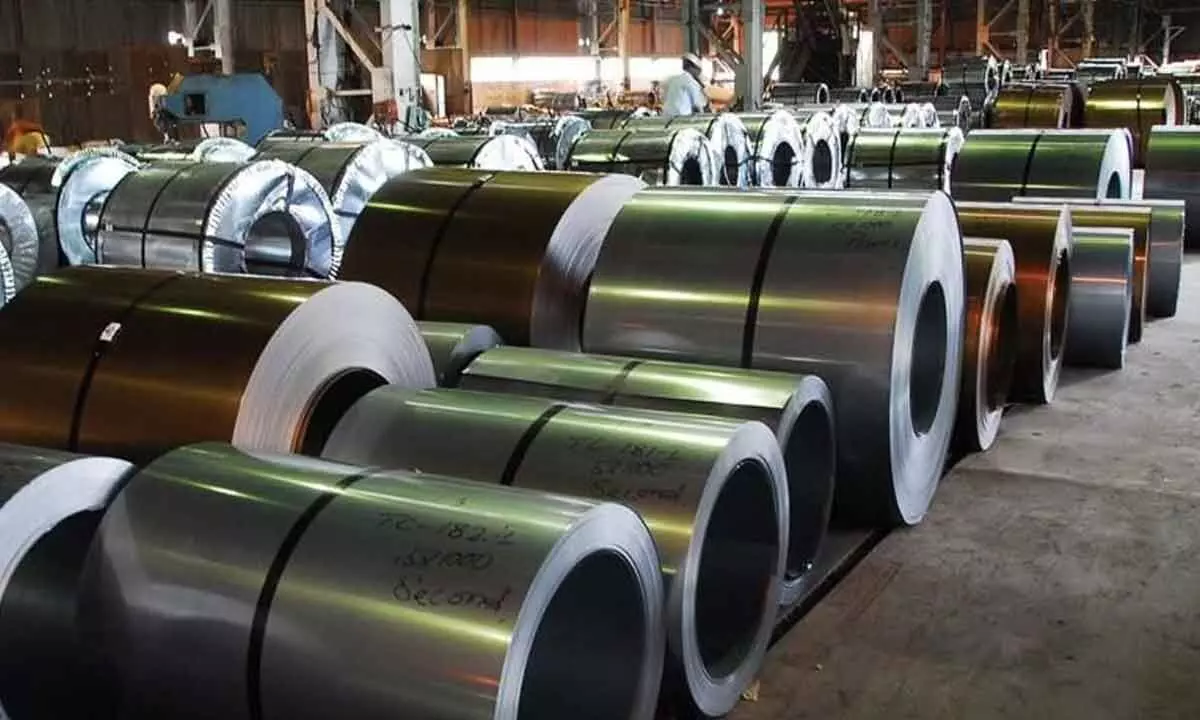`1.10L-cr investment in SAIL comes under fire
The decision comes at a time when DIPAM is in the process of demerging Nagarnar Steel Plant and 100% sale of RINL
image for illustrative purpose

Visakhapatnam: The decision of the Ministry of Steel to invest liberally in the capacity augmentation of Steel Authority of India Ltd (SAIL) at an estimated cost of Rs 1.10 lakh crore by 2030 came under attack from the employees' unions and officers' organisations.
SAIL plants have a total capacity of 20.63 million tonnes, which the government wants to raise to 35 million tonnes of crude steel by 2030. The decision comes at a time when the Department of Investment and Public Asset Management (DIPAM) under the Ministry of Finance is in the process of finalising bids for disinvestment of Nagarnar Steel Plant in Chhattisgarh. The integrated greenfield steel plant near Jagdalpur bordering Odisha is set up by mining major NMDC with a capacity of three million tonnes by investing Rs 21,940 crore. NMDC spent Rs 20,514 crore on construction till March 31, 2022. The NMDC board has already approved the demerger of the steel plant.
SAIL capacity increase is proposed at a debt equity ratio of 1:1 as part of New Public Sector Enterprises Policy, which envisages a lesser role for the government.
The Cabinet Committee on Economic Affairs approved on January 23, 2021 for 100 per cent sale (by way of privatisation) of Rashtriya Ispat Nigam Limited (RINL), the corporate entity of Visakhapatnam Steel Plant (VSP) leading to protests in Andhra Pradesh and threat to reverse the decision by Bharat Rashtra Samiti (BRS) if it gets a chance to play a big role in government-formation in 2024. VSP has 7.3 million tonnes per annum capacity with a land bank of over 20,000 acres.
There is buzz that the government after offloading its shareholding of 60.79 per cent in Nagarnar Steel Plant, will give 10 per cent share to NMDC in the new company to give an impression that NMDC still will have a role to play in the project. The expression of interest for buying RINL, its joint ventures and subsidiaries may be floated anytime once due diligence study is over.
"The entire policy of the government is ridiculous. On one hand, they are selling the Nagarnar Steel Plant developed by NMDC and on the other, want to sell away RINL lock stock and barrel, which was established after 'Visakha Ukku, Andhrula Hakku,' agitation. Instead of adopting such a stand, the government should explore merging SAIL, NMDC and RINL to make it a giant steel PSU to make the job easy for making India a 300 million tonne nation by 2030 with minimal investment," Visakha Ukku Parirakshana Porata Samiti chairman and recognised union leader D Adinarayana told Bizz Buzz.
India's present steel production is 120 million tonnes and the National Steel Policy-2030 target of 300 million tonnes is a long way to go. "SAIL management is forced to invest thousands of crores of rupees for expansion from its own resources. On the other hand GoI is inviting bids from only private parties for VSP with a massive capacity and NMDC with three million tonne capacity. Surprisingly, SAIL is not even allowed to participate in bidding for Nagarnar. This will not be a right approach for capacity expansion of steel as proposed by 2030," Katam SS Chandra Rao, president of Steel Executives' Association (SEA) and vice president, National Confederation of Officers Associations (NCOA) said.
Pleading for merger of steel PSUs viz SAIL and RINL along with NMDC, he said the merger of steel PSUs will make production cheaper and the operating cost less. All the three PSUs (RINL, SAIL and NMDC) come under the same board which will ease the operation procedures and minimise the cost at greater level. This will also make steel products available at a reasonable price because of government control, he contended.
Rao said steel PSUs will create large employment when compared to private plants. Creating adequate employment opportunities for the youth of 45 crore and above, the steel industry should be in the public sector along with the private sector to make 'Nirbhara Bharat' possible.

